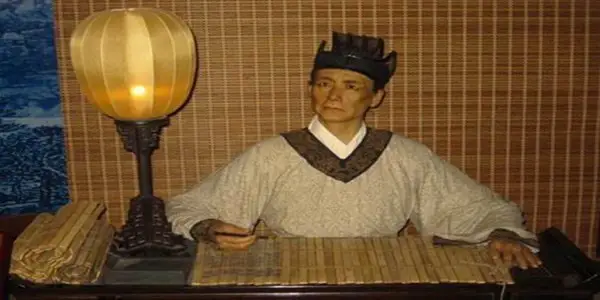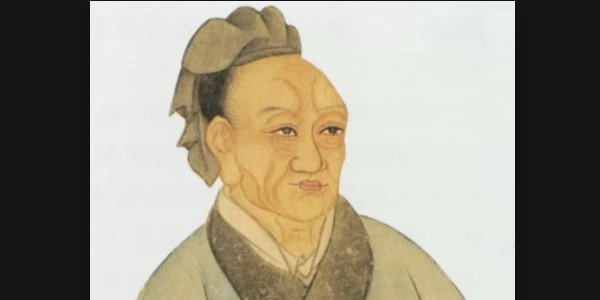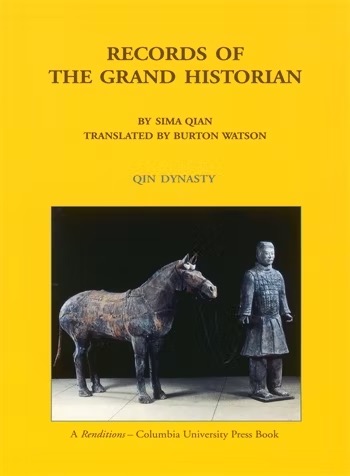During the Han Dynasty, Sima Qian was a prominent figure in Chinese history. He is revered as the “father of Chinese historiography” and is considered one of the most pivotal figures in Chinese history. This article delves into Sima Qian’s biography and works.
Who Was Sima Qian?

During the Han Dynasty in China (145-86 BCE), historian, writer, and court official Sima Qian lived. His father was the grand historian of the Han court, and he was thus born into a family of court historians. Like his father before him, Sima Qian became a court historian, serving as grand historian for Emperor Wu of Han.
Prolific author and scholar Sima Qian spent his entire life compiling the Records of the Grand Historian, an exhaustive account of Chinese history from antiquity through the Han dynasty. Aside from his genealogical work, he also penned biographies of notable figures and accounts of historical events. Because he was the first historian to do so, his work was groundbreaking. His work was the first comprehensive history of China, and it included accounts of myths and legends that were significant to the ancient Chinese.
Truth and accuracy were very important to Sima Qian, and he would not budge from his principles under any circumstances. In 99 BCE, Emperor Wu commissioned him to write a history of the Xiongnu, a powerful nomadic tribe that had been an irritant to China for centuries. Even after learning that the emperor had been misled by one of his advisors, Sima Qian refused to recant his account and was consequently imprisoned and tortured.
Although he was imprisoned for his writing, Sima Qian never wavered in his dedication to his craft. Shortly before his death in 86 BCE, he finished the Records of the Grand Historian, leaving behind a work that would serve as an inspiration to future historians and academics.
One cannot overstate Sima Qian’s impact on modern Chinese history. He wrote a detailed account of China’s past that became a standard for future researchers. Further, he established a benchmark for honesty and precision in historical writing that continues to influence Chinese academics today. His legacy lives on, and his works continue to serve as a go-to resource for learning about China’s past and present culture and history.
Where Did Sima Qian Live?

During the reigns of Wu and Wen, Sima Qian was a court historian in ancient China’s Han dynasty. Hancheng is a city in the province of Shaanxi in modern-day China, where he spent his childhood. Chang’an was the political and cultural centre of the Han dynasty, and Sima Qian spent much of his life there as a court official. In addition, he spent a great deal of time travelling throughout China in search of material for his historical works.
how did sima qian die?
It is believed that Sima Qian took his own life in 86 BCE. For his part in the case of Li Ling, a general who had been captured by the Xiongnu and forced to serve them for several years, he had been sentenced to castration as punishment. Considering that Sima Qian’s father was Li Ling’s superior officer and was therefore held responsible for his capture, his inquiry into the matter was interpreted as a criticism of the Han government. Sima Qian committed suicide rather than undergo castration, which would have made him an outcast in Chinese society. Legend has it that in his final moments before taking his own life, he completed the Records of the Grand Historian, ensuring that his life’s work would be archived for posterity.
What Happened to Sima Qian?
what did sima qian do for china? As a historian and court official, Sima Qian faced numerous difficulties throughout his life. His life was forever altered in 99 BCE when he was tasked by Emperor Wu with writing a history of the Xiongnu, a nomadic tribe that had long been a thorn in China’s side. Sima Qian refused to change his story when he learned that the emperor had been misled by one of his advisors and had made a strategic error in his dealings with the Xiongnu. Because of this, he was imprisoned and tortured as part of his harsh punishment.
Castration was part of the punishment for Sima Qian, a brutal act that would have left him an outcast in Chinese society. Nevertheless, Sima Qian showed remarkable fortitude and commitment to his work by opting to take the punishment rather than compromise his integrity. He continued to serve as a court historian, but his castration made him ineligible for higher office.
The difficulties he faced did not stop Sima Qian from writing and publishing significant historical works, such as the Records of the Grand Historian. This massive tome, which ran to more than 130 chapters and covered Chinese history from antiquity through the Han dynasty, is still regarded as a landmark in the field of Chinese historiography.
Why is Sima Qian Important?
It is generally agreed that Sima Qian is one of the most influential historians in China, and that his work has had far-reaching effects on Chinese culture and society as a whole. His commitment to maintaining the veracity and accuracy of historical records has left a lasting legacy that has influenced many scholars and historians to come.
He wrote the Records of the Grand Historian, which is a major work in its own right and a big reason why Sima Qian is so significant. With its exhaustive coverage of Chinese history from antiquity through the Han dynasty, this monumental work established a new standard for systematic and organised Chinese history writing. Sima Qian’s work is still studied and revered by historians today because of the new standard he established for historical writing in China through his dedication to accuracy and objectivity.
Sima Qian was a significant figure in the political and cultural climate of his era, in addition to his contributions to historical writing. In his position as a court official, he was privy to the inner workings of the Chinese government and had a front-row seat to the events and social shifts that shaped the country. As a result of his position, he was able to influence the Han dynasty’s cultural and intellectual development, and his writings were instrumental in articulating China’s literary and philosophical canon.
The truth and his willingness to stand up for what he believed in, despite punishment and persecution, are the final reasons why Sima Qian is significant. Countless scholars and historians have been influenced by his unwavering commitment to honesty, integrity, and accuracy.
Why Did Sima Qian Write the Shiji?

Shiji, or Records of the Grand Historian, was written by Sima Qian for a variety of reasons. He recognised, first and foremost, the need for an all-encompassing history of China that would unify the various threads of the country’s past and present a unified account of its evolution. He thought such a work would serve as a record of China’s cultural and intellectual achievements while also educating future generations of scholars and leaders.
Sima Qian wrote the Shiji for a variety of reasons, not the least of which was his desire to compile a full account of China’s past. He felt it was his duty as a court official to disseminate the wealth of knowledge and information he had amassed about China’s past. In addition, he had a strong conviction that it was his duty to eliminate all errors and misrepresentations from China’s historical record for the sake of future generations.
Sima Qian’s conviction that the past can influence the present and the future was a further motivating factor in his decision to pen the Shiji. He thought that learning from the successes and failures of the past could help people deal with the challenges of the present and the future, and he saw history as a powerful tool for doing both of these things.
Finally, Sima Qian penned the Shiji to promote China’s cultural and intellectual traditions and honour the accomplishments of the Chinese people. He intended his creations to be a celebration of his country’s history and a call to action for the next generation to continue expanding upon the foundations their forebears had laid. Overall, Sima Qian’s complex and multifaceted motivations for penning the Shiji were indicative of his love for his country and his dedication to perpetuating its history and culture.
How Did Sima Qian Preserve Chinese History?
By conducting extensive research and writing with a dedication to objectivity and accuracy, Sima Qian ensured the survival of China’s historical record. He diligently sought to ensure the accuracy and thoroughness of his accounts by collecting data from a wide variety of sources, including official records, historical texts, and interviews with knowledgeable individuals. In addition, he meticulously checked the credibility of his sources and eliminated any alterations or inaccuracies from the historical record. Writing the Shiji, Sima Qian raised the bar for Chinese historians, and his contributions to the field of history have had far-reaching effects on Chinese society and culture.
Sima Qian’s Contribution to History
The impact of Sima Qian on the course of human events is incalculable. The Shiji, which he authored, is widely considered to be a literary and intellectual masterpiece. It not only provides a thorough account of Chinese history up to his time, but it also establishes a new benchmark for historiography, which has influenced countless subsequent historians and authors.
Sima Qian’s use of a new narrative style that combined chronological and thematic approaches to historical writing is one of his most important contributions to the field. He did not present a simple chronological account of events, but rather structured his work around central themes that allowed him to delve into various facets of Chinese history and culture. By taking this tack, he was able to present a more nuanced and sophisticated history of China, one that brought to light the intricate interplay between social, political, and cultural factors in the country’s evolution over time.
Sima Qian also made a significant impact on history through his call for historians to be objective and factual in their work. He was firm in the conviction that historians had an obligation to present an accurate and unbiased account of the past, and he laboured long and hard to ensure that his writings met this standard. This dedication to objectivity and detail raised the bar for historical writing in China and helped to solidify the study of historiography as a serious academic subfield.
Beyond his work on the Shiji, Sima Qian made numerous other historical contributions. As a court historian and official, he was crucial in the establishment of the imperial archives and library system, which laid the groundwork for the preservation and dissemination of China’s literary and cultural heritage.
Sima Qian Quotes
The Shiji, authored by the prolific writer and historian Sima Qian, is still considered one of the most influential and pivotal works in all of China. Throughout his life, he also wrote extensively on a wide variety of topics, and his works have had a significant impact on Chinese culture and society. Some of his most renowned sayings are as follows:
1 “Water brings pleasure to the wise, while hills do so to the righteous. The prudent move forward while the righteous remain at peace. Those who are wise are happy, and those who are good live long.” origin: Shiji
2″Only when a man has come to the end of his life and stared death in the face can he know the true nature of existence.” origin: Shiji
3 “Wisdom is not a prerequisite for greatness, and not all wise men achieve prominence. The man who is both wise and great is uncommon.” origin: Shiji
To put it another way: “If a man has no friends to share his joys and sorrows with, then his life is truly desolate.” origin: Shiji
“The art of writing history is not merely a matter of recording facts; it is also a matter of conveying the spirit of the age and the character of the people,” 5. origin: Shiji
Each of these quotations demonstrates Sima Qian’s keen insight into the nature of humans, love of the outdoors, and dedication to learning and truth. They also show how he values friendship, the complexity of the human experience, and the ability of literature to capture the essence of a time and place. His legacy as a scholar and historian lives on through his works, which continue to motivate and educate modern readers.
Sima Qian, The First Emperor Summary
From prehistoric times to the fall of the Han Dynasty, Sima Qian covers it all in The Records of the Grand Historian. The story of Qin Shi Huang, the first emperor of China, is one of the most well-known and influential parts of the book.
This book marks the beginning of the Imperial Era in Chinese history by describing the ascension of the emperor to power and his unification of the previously warring states under his rule. Numerous accomplishments are attributed to the emperor, such as the establishment of written language standards and the building of the Great Wall of China. His rule, however, was also notoriously harsh, with numerous reports detailing his use of torture and executions to keep his grip on power.
The emperor’s search for an immortality potion and his building of a massive tomb containing terracotta soldiers and other treasures are both detailed in the book. The emperor’s fixation on achieving immortality is interpreted as a manifestation of his anxiety about dying and his need to solidify his legacy.
The story of the First Emperor as told by Sima Qian is a crucial historical record for understanding the political and cultural climate of ancient China. In doing so, it illuminates the emperor’s complicated legacy, from his role in China’s unification and development to the darker aspects of his rule.
Finally, Sima Qian, a man who lived during the Han dynasty in China, was a well-known historian. The Records of the Grand Historian, his magnum opus, is still studied and revered as a cornerstone of Chinese historical scholarship today.
